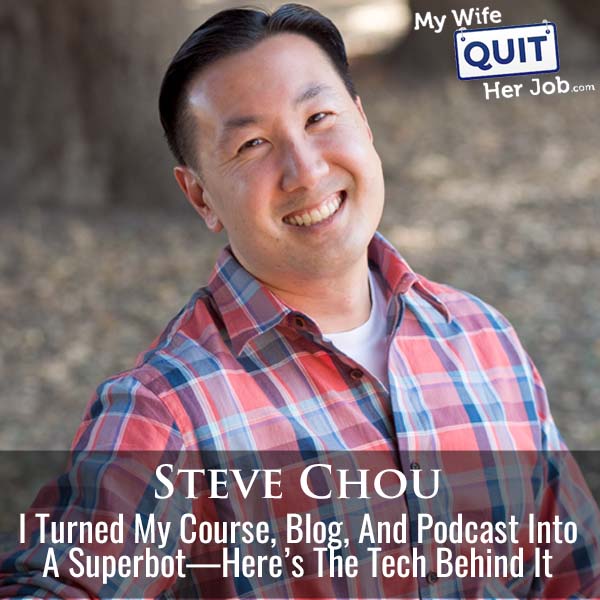598: I Turned My Course, Blog, And Podcast Into An AI Bot – Here’s The Tech Behind It

```html E-Commerce Expert Steve Chou Unveils "SteveBot": An AI-Powered Knowledge Assistant
E-commerce entrepreneur Steve Chou, known for his MyWifeQuitHerJob.com blog and podcast, has launched "SteveBot," a custom AI assistant designed to provide instant answers to frequently asked questions related to his online courses, blog, and podcast content. This project aims to streamline information access for students and audience members navigating a vast library of resources. The announcement was made on the My Wife Quit Her Job podcast, where Chou detailed the technology behind the bot and its potential impact on online learning.
The Genesis of SteveBot: Addressing Information Overload
Chou explained that the motivation behind SteveBot stemmed from the growing volume of content within his e-commerce courses. With over 450 videos, students often struggled to locate specific information, leading to repetitive questions already addressed in existing materials. "I kept getting questions that were already covered in the videos in the class," Chou stated. "Since there's like 450 videos, I get it, you probably didn't watch the one that yielded the answer."
His wife and business partner, Toni Chou, echoed this sentiment, noting that even she sometimes struggles to pinpoint the exact location of specific lessons due to the granular nature of the course content. SteveBot is designed to function as an advanced search tool, providing users with direct answers and links to relevant videos or blog posts.
Technical Architecture: RAG Database and OpenAI's Whisper
SteveBot is powered by a Retrieval-Augmented Generation (RAG) database, a technique that allows the AI to access and synthesize information from a large corpus of data. Chou's data source includes transcripts of his course videos, podcast episodes, and blog posts. The initial hurdle was transcribing hundreds of videos, a process Chou automated using OpenAI's open-source Whisper model.
While OpenAI offers paid transcription services, Chou opted for the free Whisper model, running it locally on his machine. He acknowledged that this process was time-consuming, currently processing videos at a rate of three minutes per video. A faster video card could have significantly reduced processing time.
Challenges in Training the AI Model
Chou highlighted the limitations of directly feeding large amounts of data into AI models like OpenAI. These models have context windows, restricting the amount of information they can process at once. As a result, he had to break down transcripts into smaller chunks and tag them with relevant topics. "You have to break up each of these transcripts into blocks," Chou explained. "If you can, you summarize each of those chunks and you tag them."
He also noted that podcasts, due to their conversational and topic-shifting nature, are particularly challenging to train AI on. Ideally, the transcript should be broken into chunks focusing on a single topic, with each chunk properly labeled.
Expert Perspective: The Rise of AI-Powered Knowledge Management
"Steve Chou's SteveBot is an excellent example of how AI is transforming knowledge management and online learning," says Dr. Anya Sharma, a professor of Educational Technology at the University of California, Berkeley. "The ability to quickly access and synthesize information from a vast library of resources is crucial for effective learning. RAG databases, like the one used in SteveBot, are becoming increasingly popular for this purpose."
Dr. Sharma added, "The challenge lies in ensuring the accuracy and relevance of the information retrieved by the AI. Careful data curation and ongoing monitoring are essential to maintain the quality of the knowledge base."
Historical Context: E-Commerce Education and the Democratization of Knowledge
The creation of SteveBot reflects the evolution of e-commerce education and the increasing democratization of knowledge. In the early days of online business, information was often scattered and difficult to access. Platforms like MyWifeQuitHerJob.com emerged to provide structured courses and resources, helping aspiring entrepreneurs navigate the complexities of e-commerce.
Now, AI is taking this process a step further, offering personalized and on-demand access to information. This trend aligns with the broader movement towards personalized learning and adaptive education.
Future Plans: Monetization and Expansion
Chou is considering offering SteveBot as a paid service, potentially as a stepping stone for individuals interested in joining his full e-commerce courses. He also plans to expand the bot's knowledge base to include his podcast and blog content, creating a comprehensive resource for anyone seeking information on e-commerce and online business.
Addressing the Facebook Live Video Removal Policy
During the podcast, Toni Chou raised concerns about Facebook's policy of removing live videos after 30 days. This prompted a discussion about strategies for preserving and transcribing valuable video content. Steve Chou recommended using tools like Make.com to automate the process of extracting transcripts from videos stored in Dropbox, leveraging OpenAI's Whisper model. He also suggested Riverside FM as a free transcription service for smaller video collections. ```
Originally sourced from: WifeQuitHer Job
